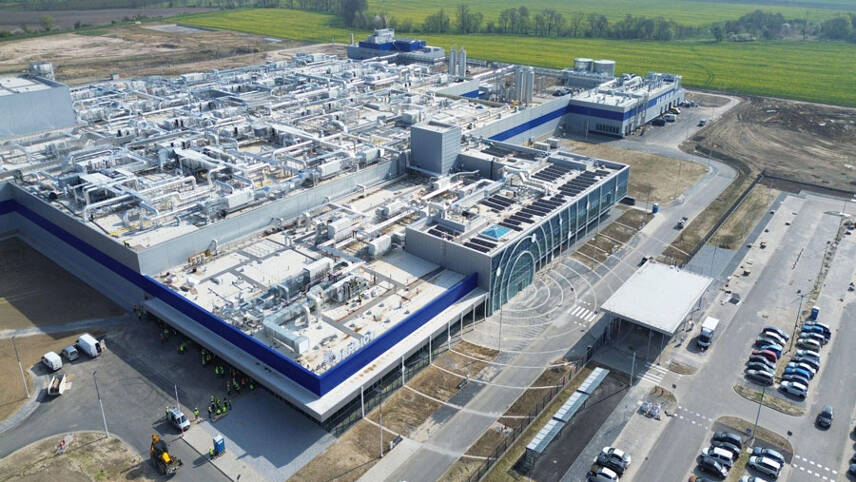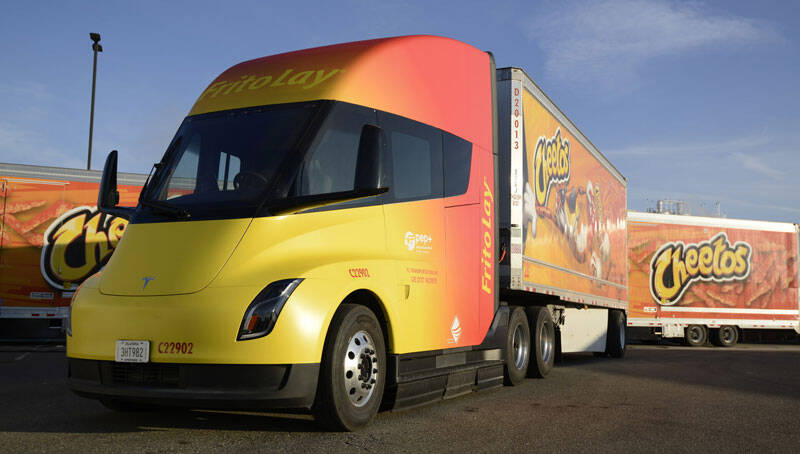Register for free and continue reading
Join our growing army of changemakers and get unlimited access to our premium content

Within the past month, PepsiCo opened what it claims is its most sustainable factory in Europe.
The €300m snack factory in Poland (pictured above) is set to become carbon-neutral by 2035 without the use of offsetting. It is kitted out with an anaerobic digester to transform potato peelings into fertiliser; heat and water recycling systems and energy-efficient equipment. Rooftop solar panels are already in place and ground-mounted panels are in the works.
Given that PepsiCo has around 1,000 manufacturing facilities across the world, how will learnings from this new flagship factory be scaled up?
The company’s vice president for global sustainability, Roberta Barbieri, explains that the firm is already in the process of developing and implementing site-specific action plans for decarbonisation at each of its factories. These plans are aligned with a 40% reduction in emissions across all scopes by 2030, per climate targets set by PepsiCo in 2021.
“Every site is different; there is almost never a one-size-fits-all solution or even group of solutions,” Barbieri explains. Key differentiators include local regulation, plant size and nearby infrastructure provision.
But most sites do have one thing in common – emissions tend to be split evenly between Scopes 1 (direct) and 2 (power-related).
Key to driving progress across both Scopes, Barbieri says, is energy efficiency. In the early stages of developing any plant’s action plan comes the RECON programme – short for ‘resource conservation’ and akin to a “SWAT team for efficiency”.
Under this programme, sustainability experts and senior executives team up with site directors. They “descend on a plant for four or five days, to work through, inch by inch, energy efficiency and water efficiency opportunities”. The results may indicate that changes to behaviours and processes are needed, or perhaps a more significant investment into new technologies.
Sunny side up
Barbieri believes that Scope 2 emissions are easier to address than Scope 1, provided that the nation or region in which the factory sits has decent renewable electricity infrastructure and a market for a mix of clean energy options for the private sector.
PepsiCo is targeting 100% renewable electricity across its direct operations by 2030. For its third-party operations and franchise sites, the deadline in 2040.
Wherever possible, Barbieri says, the company is seeking to install onsite solar and to forge Power Purchase Agreements (PPAs) to ensure additionality. She describes Renewable Energy Certificates (RECs), known as REGOs in Europe, as useful in that they can be a “bridge” to PPAs and onsite solar in nations without mature renewables markets. In this case, she argues, it is on companies like PepsiCo to engage with policymakers to prove that there is business appetite for change.
This isn’t to say that PPAs and onsite solutions are without their own unique challenges.
On PPAs, Barbieri explains: “The delay in supply chain provision of materials is really long at the moment… a good example is that, when we look at additional PPAs in the US at the moment, we anticipate the build time from us signing the contract to the solar farm coming online to be 24 months. Pre-Covid, it was around 12 months.”
The US is the world’s largest PPA market. Activity there increased by 18% year-on-year in 2022 to reach a record 24.1GW, according to Bloomberg NEF.
Regarding onsite solar, Barbieri says that PepsiCo “runs into space issues more than anything”. As a rule of thumb, rooftop panels on factories do not generate enough electricity to meet more than 20% of a site’s needs. As such, PepsiCo is “increasingly” exploring solar panels on car parking facilities.
Almost 50 of PepsiCo’s owned plants now have solar onsite, and having solar is becoming a mandatory requirement for all new sites and major retrofit projects. The business also has eight biogas generators that process waste from the manufacturing process. One of these is at the Leicester-based Walkers factory, providing 30% of the site’s electricity needs.
Heating and vehicles
It bears noting that beverage plants use a lot of electricity and have lower thermal energy demands. The opposite is true for snack manufacturing sites. Meeting PepsiCo’s climate targets will require steep decarbonisation in heating as well as in electricity.
At some plants, including one in the Netherlands, electric heating solutions are being deployed. This technology will at least halve emissions related to the crisp frying process.
But, at the moment, biofuels are playing a bigger role in PepsiCo’s lower-carbon heating efforts. The company has six biofuel boilers across plants in the US and India, which burn fuels made using waste from agricultural waste. In India, a key feedstock is waste from rice crops.
PepsiCo has described scaling biomethane generation as “the next step”. Earlier this year, the company switched on its first biomethane generator in Turkey. The unit processes waste potato peelings, resulting in methane, which can be directly used as a fuel. A similar unit is now on order for Portugal.
Biofuels are also a key component of PepsiCo’s strategy for decarbonising its owned fleet of heavy goods vehicles, which come under Scope 1 emissions. Deliveries of Quaker Oats products in the UK are made using vegetable-oil-based fuels with 80% less emissions across the lifecycle than diesel. More than a dozen biofuel-powered trucks are in operation in Brazil.
These vehicles operate alongside electric models, with this mix most visible at the snack factory in Modesto, California. It is the company’s first site to end the use of traditional vehicles and houses more than 100 full-time drivers, all operating either zero-emission or near-zero-emission models, including Teslas (pictured below). The aim is for this site to be used as a “showcase” for other locations to follow suit.
But there are caveats regarding scaling low-carbon fleets. Barbieri says the “biggest blocker” is that utilities are often not able to install a lot of EV charging infrastructure at a site, but remains optimistic that “massive change” is on the horizon to meet growing demand.
Barbieri additionally explains that procuring specialist EVs and biofuels is “highly dependent on the marketplace”, with more investment “desperately needed” to properly scale supply in the long-run.
On EVs, PepsiCo is certainly not the only large business with this challenge. Access to a diverse enough range of vehicles, delivered to swift timelines, has been raised by the Climate Group’s EV100 initiative several years in a row. This initiative convenes more than 125 businesses that collectively operate more than 400,000 EVs.
On biofuels specifically, Barbieri points to some additional challenges. She says: “We need the flexibility to use market-based mechanisms like certificates.
“Right now, the Science-Based Targets initiative and the GHG Protocol are not supportive of using market-based mechanisms for Scope 1 or Scope 3 decarbonisation. This is quite limiting and has real potential to slow us down.”
“In a capitalist market, folks need to make money – and monetising the environmental attributes of the work they do is one way to do this.”
So, even for the largest of businesses, external factors are making investments in low-carbon technologies more complicated than they can be. This is why Barbieri believes bringing businesses and other organisations facing the same blockers together to advocate for change is just as crucial as any one technology.
Learn more at edie’s net-zero innovation webinar on 28 June
Technological innovation is arguably the most critical enabler of the global transition to a net-zero carbon economy. But which technologies are most viable and will have the biggest decarbonisation impact if deployed by businesses today? What policies, frameworks and funding mechanisms will help to increase the development and uptake of green innovations, both in the UK and globally? And what emerging technologies and solutions hold the most potential to achieve a net-zero-carbon future?
FInd out in our free-to-attend online event on Thursday 28 June, beginning at 1pm BST. Speakers from innocent Drinks, Iron Mountain and Springwise have been announced.
Find out full information and register here.



Please login or Register to leave a comment.